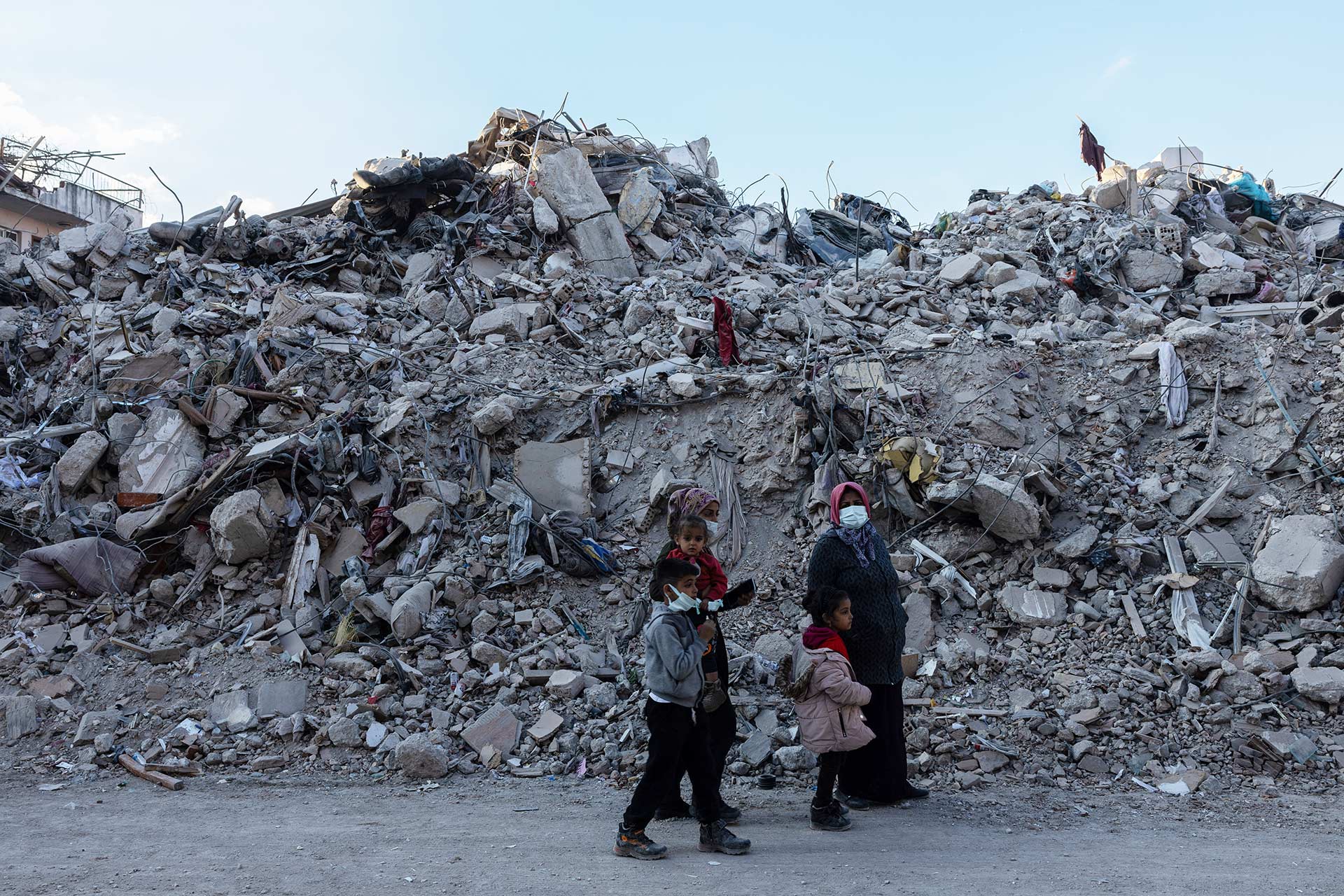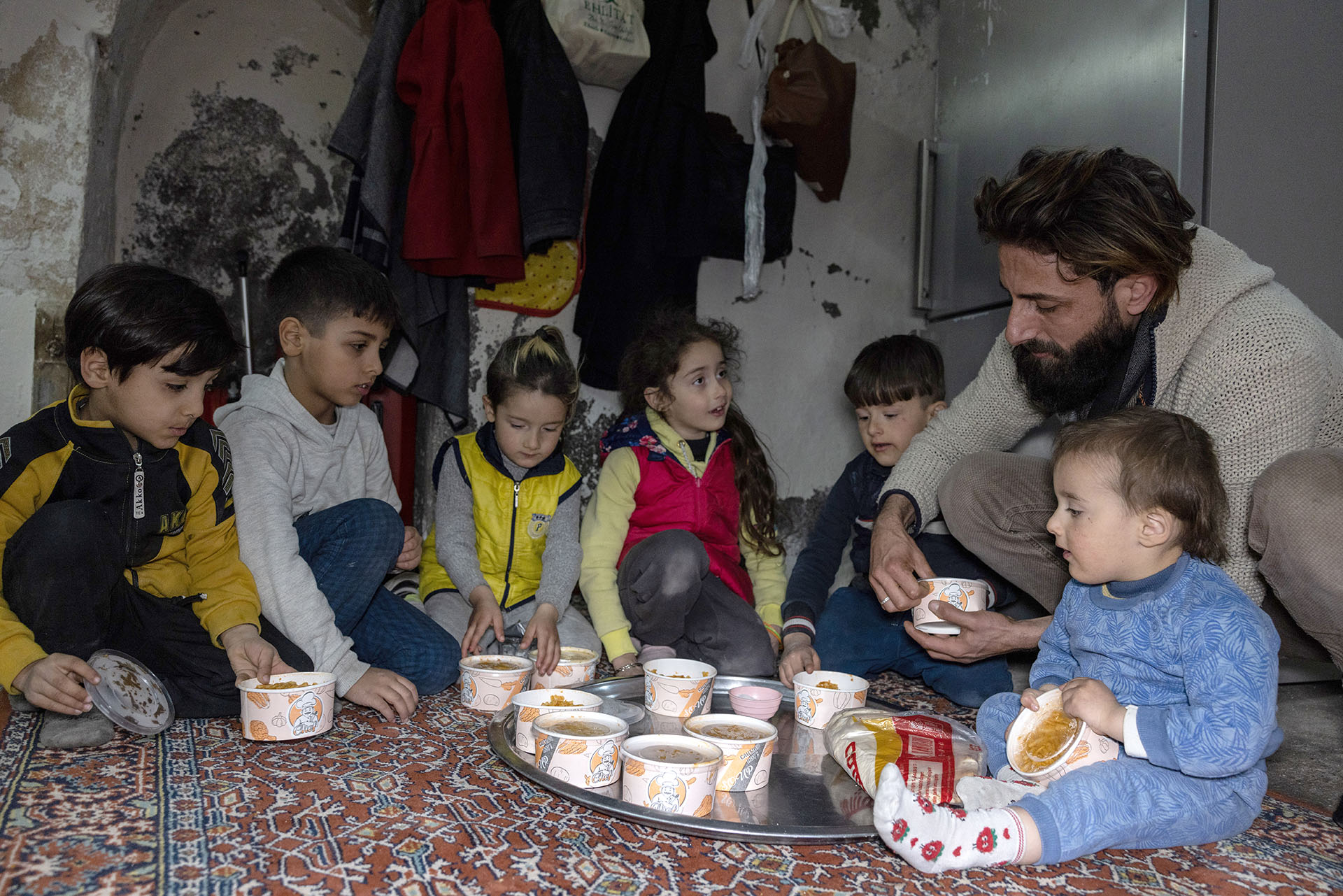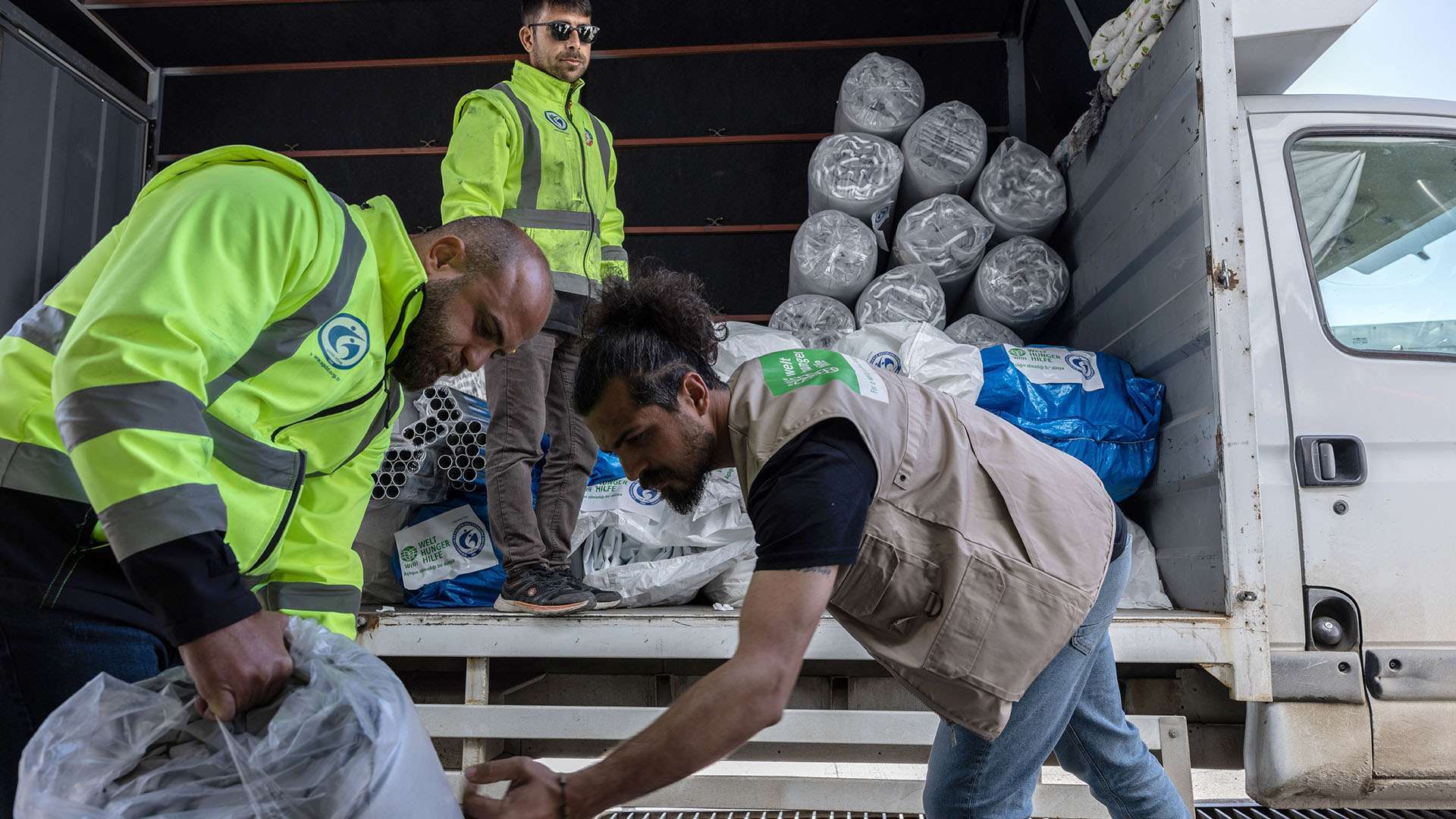FAQ
Frequently asked questions about earthquake relief in Syria and Türkiye
Zur Hauptnavigation springen Zur Suche springen Zum Seiteninhalt springen Zum Footer springen

© Stefanie Glinski/Welthungerhilfe
One year after the catastrophe
One year after the devastating earthquakes of February 6, 2023, the situation in south-east of Türkiye and northwestern Syria remains difficult. More than 56,000 people lost their lives in the disaster of the century. In total, more than 20 million people were affected.
In Syria, most affected families still live in destroyed homes or tents. "It is frightening how cold it gets when you sit in these houses for just a few minutes," says Roxana Romanica, who visited a refugee camp a few weeks ago. Cold, mud and the feeling of having been forgotten characterize the living conditions of the people.
In the immediate aftermath of the earthquake, we supported the victims with essential relief items such as food, tents and clean water. Today, we continue to work with the local people to address the long-term consequences of the disaster.

© Stefanie Glinski/Welthungehilfe
Like Ali Al-Hassan and his family. They fled Syria eleven years ago. He lived with his wife and children in the Turkish city of Urfa, but the quake destroyed their home. "It was the worst minute of our lives. We tried to leave the house and run downstairs from the third floor, but the lock was stuck. I thought the ceiling was going to collapse and bury us all under it." Fortunately, the family was able to save themselves.
A partner organization of Welthungerhilfe was able to find them a place to stay in Mardin. They and about 1,000 other families also received hot meals every day for several weeks.
In the immediate aftermath of the earthquake, we supported approximately 150,000 people with a variety of activities:

© Stefanie Glinski / Welthungerhilfe
With your donation for earthquake relief in Türkiye and northwestern Syria, we were able to quickly and effectively help people who lost everything in the earthquake - and continue to do so today. Over the past six months, our support has included:
Make sure that we can continue to provide rapid assistance in the future. Your donation will help us to support people around the world to lead healthy and self-determined lives. Your donation is used where it is most urgently needed.
Together with partner organizations in Türkiye and Syria, we provided life-saving emergency relief in the immediate aftermath of the earthquake. See some of our efforts:
Frequently asked questions about earthquake relief in Syria and Türkiye
Together with our partner organization SARD, we distributed blankets, tents, ready-to-eat meals and stoves to people affected by the earthquake in northwestern Syria. A community center was repaired for use as an emergency shelter. Other minor repair work has been carried out to stabilize damaged buildings.
In Türkiye, we supported people with food, baby food and drinking water.
WHH has its regular offices in Türkiye in Gaziantep, Kilis, Mardin and Hatay, as well as in Istanbul and in the northern Syrian provinces of Idlib and Aleppo. We have implemented our relief work in the affected areas near these sites.
We implement projects – including emergency aid – ourselves or through independent local partner organizations that we trust. Passing on funds or goods is not transparent and does not comply with our Code of Conduct. Project activities, whether in development cooperation or emergency aid, are always budgeted and all expenditures must be accounted for. Our projects are subject to regular internal and external audits to ensure that funds are used correctly. Corruption is an offense that will be punished. This is agreed upon by each WHH employee in their contract. Before distributing relief supplies, surveys are carried out to determine which people have what exact needs. We recorded the distribution of relief supplies to individuals so the process could be measured and carried out equitably.
In the event of crises and disasters, WHH only sends qualified staff who have undergone security training to the affected regions. They coordinate the relief measures professionally on the ground. In the regions affected by earthquakes, we have always worked with reliable partner organizations and can thus make optimum use of existing structures and contacts to provide aid to those in need. We understand that many people want to volunteer, especially when their own family and friends have been affected by the disaster. However, please understand that while we sincerely appreciate such offers of help, we cannot accept them. Coordinating volunteers would take a lot of additional energy. Furthermore, especially in disaster situations, experience and expertise in crisis management, language and local knowledge are absolutely necessary. All WHH employees who are sent to crisis regions must have completed safety training in advance. We hope you understand that we cannot accept offers for this reason.
Relief goods such as clothing, food, tents, hygiene articles, etc. were available locally or at least regionally. As a matter of principle, WHH strives for local and regional procurement, because this means that less money is spent on avoidable transports, import duties, storage, distribution costs, etc. The money saved can be better invested directly in aid. WHH can better invest the money saved directly in aid. Moreover, we can strengthen the markets in a country and trust that the needs will be served appropriately and that the food and other relief supplies that people are accustomed to will be accepted. The organizational and financial effort for the coordination of donations in kind from overseas is extensive and ties up personnel and money that is urgently and quickly needed for immediate aid in such a disaster. We were able to procure relief supplies both in Türkiye and in northwestern Syria.
In 2022, we were able to accomplish a lot with your help
WHH stands for transparency and quality, verified information, and the cost-effective and goal-oriented use of donations. For this reason, the German Central Institute for Social Questions (DZI) has awarded us its donation seal. We put your donation to work with precision and responsibility. If we receive more donations than needed for a specific project, the surplus is directed toward other WHH projects that require funding.
A life without hunger is a human right. Yet millions of people around the world go hungry. Together with our supporters, we have a goal: #ZeroHunger by 2030 – in line with the United Nations Sustainable Development Goals.
WHH works according to the principle of "empowering people to help themselves". We implement aid projects so that people can sustainably provide for themselves and make our own work superfluous in the long term. With our donors, we support entire communities worldwide in order to improve their infrastructure and advance their development to create a fair foundation for all people in a region.
Yes! Up to €300 is recognized by the German tax office without a donation receipt and is tax-deductible. A bank statement is sufficient as proof.
For donations over €300, the tax office requires an annual donation receipt, which we send automatically at the beginning of the following year. If you need a donation receipt beforehand, please let us know.
Donating via our online donation form is just as secure as online banking. The data is transmitted fully encrypted. We use the SSL procedure for the encryption.
To ensure that the use of donations is traceable, we make this process as transparent as possible. Therefore, WHH regularly reports on aid projects in our annual report so that you know what happens with your donations.
Deutsche Welthungerhilfe e. V.
Sparkasse KölnBonn
IBAN DE15 3705 0198 0000 0011 15
BIC COLSDE33
Welthungerhilfe has been holding the DZI seal of approval for donations since 1992. The seal certifies that Welthungerhilfe is handling the funds entrusted to it efficiently and responsibly.